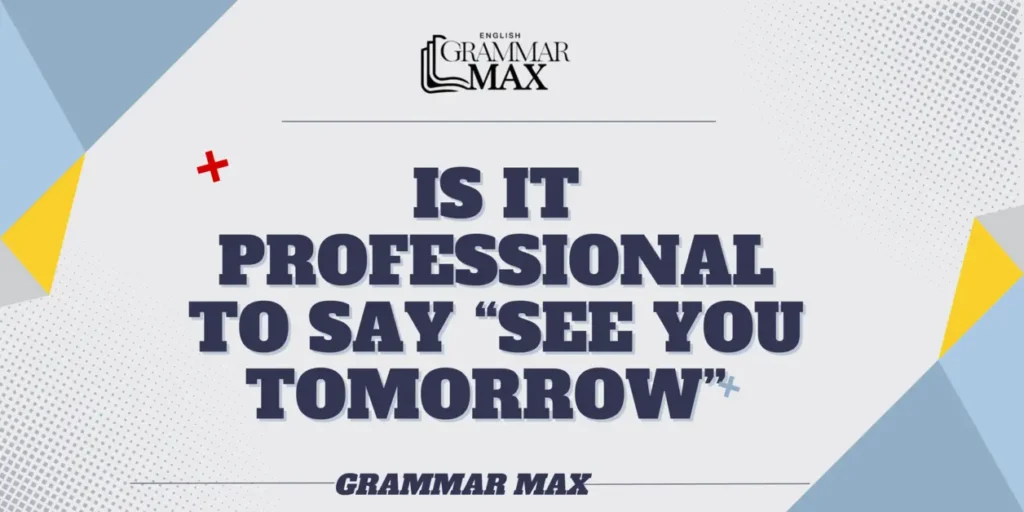See You Tomorrow is a common phrase used in both personal and professional settings to confirm a meeting or appointment for the next day. In the workplace, however, it’s beneficial to convey this simple message with a more professional touch, especially when addressing colleagues, clients, or supervisors. Choosing alternative phrases that resonate with business communication adds a sense of formality, clarity, and respect to the interaction, helping foster a positive and professional tone.
We’ll explore 20 alternative ways to say “See You Tomorrow” professionally. These expressions fit various scenarios in a work-related environment and offer different tones to suit your particular needs, whether it’s for a casual check-in or a formal meeting. Let’s look at these phrases in detail and see how they can help refine your professional language.
Alternative ways to say “see you tomorrow”

You can these ways instead to say “See You Tomorrow”:
- I Look Forward to Tomorrow’s Session
- Until Tomorrow
- I’ll Catch You Tomorrow
- Let’s Pick Up Tomorrow
- Anticipating Our Discussion
- See You Tomorrow in Spanish – “Hasta mañana”
- French See You Tomorrow – “À demain”
- See You Tomorrow in Italian – “Ci vediamo domani”
- I’ll See You in the Morning
- Looking Ahead to Tomorrow
- Excited for Tomorrow’s Meeting
- Be Prepared for Tomorrow’s Session
- Let’s Connect Again Tomorrow
- See You Tomorrow in Japanese – “また明日 (Mata ashita)”
- Looking Forward to Collaborating Tomorrow
- Meet You Tomorrow
- I’ll Follow Up With You Tomorrow
- Until We Meet Again Tomorrow
- Eager to Continue Our Discussion Tomorrow
- See U Tomorrow – (Casual email closing)
I Look Forward to Tomorrow’s Session
I look forward to tomorrow’s session is a polished, professional way to express anticipation for an upcoming meeting or discussion. This phrase communicates eagerness while maintaining a formal tone appropriate for a workplace environment.
In business contexts, such wording helps convey enthusiasm and a proactive attitude. When you say “I look forward to tomorrow’s session,” you’re setting a positive tone for tomorrow’s meeting, showing you’re fully engaged and prepared for future discussions. It’s an ideal phrase for both email sign-offs and verbal communication.
Best Use:
Best for formal email sign-offs when you want to express anticipation for a scheduled meeting. This phrase communicates professional enthusiasm and a positive outlook for the upcoming session.
Example: “I’m looking forward to tomorrow’s session. It will be a great opportunity to review our progress.”
Until Tomorrow
Until tomorrow is a brief yet effective professional goodbye that serves as a polite, formal farewell at the end of a conversation or email. It implies continuity, reminding the recipient that you’ll reconnect soon. This phrase works well in various work-related settings to express that you’ll see the person the next day.
This phrase offers a simple farewell while leaving the interaction open-ended for meeting tomorrow. It’s especially suited for closing emails, as it provides a courteous sign-off without being overly casual. Saying until tomorrow communicates a balanced professional tone and expresses a polite end to the day’s conversation.
Example: “Until tomorrow, James. I appreciate today’s efforts and am ready to continue.”
I’ll Catch You Tomorrow
I’ll catch you tomorrow strikes a friendly yet professional tone that works well with colleagues and team members. While slightly informal, this phrase remains suitable in a workplace environment where relationships allow for a more relaxed interaction. It’s a way to say See You Tomorrow while maintaining an approachable demeanor.
This phrase is ideal for informal office language and often fits casual conversations among team members who anticipate seeing each other in the next day meeting. It reflects a work-related farewell without being overly formal, showing a friendly commitment to meeting tomorrow without strict formality.
Best Use:
A friendly yet professional way to close conversations with colleagues in a workplace environment. This phrase keeps the tone approachable while confirming a meeting tomorrow.
Example: “I’ll catch you tomorrow, Maria. Looking forward to the team discussion.”
Let’s Pick Up Tomorrow
Let’s pick up tomorrow is a direct yet polite way to indicate that you’ll continue your discussion the next day. It works well in project-based settings where collaboration extends over multiple sessions. This phrase expresses a professional tone suitable for colleagues working on joint tasks.
The phrase implies that today’s work will flow naturally into tomorrow’s session. Using “Let’s pick up tomorrow” in a business communication demonstrates your commitment to continuity while acknowledging the importance of each team effort. It’s an excellent choice when you need a practical yet formal language alternative to See You Tomorrow.
Example: “Let’s pick up where we left off tomorrow. Thanks for all your input so far, Sarah.”
Anticipating Our Discussion
Anticipating our discussion conveys a high level of professional engagement for an upcoming meeting or scheduled session. This phrase indicates that you’re prepared for the conversation ahead and looking forward to a productive exchange. It’s perfect for settings where planning and formal language are essential.
Using this phrase in an email or conversation highlights expectation for a meaningful discussion, showing that you’re thoughtfully prepared for tomorrow. It’s well-suited for email sign-offs, particularly in a formal setting where both parties aim to achieve productive outcomes in tomorrow’s meeting.
Best Use:
Useful for formal emails to show you’re prepared for an in-depth conversation. This phrase communicates that you are expecting a discussion and ready to make it productive.
Example: “I’m anticipating our discussion tomorrow. It’s set to be a productive session, Alice.”
See You Tomorrow in Spanish – “Hasta mañana”
See You Tomorrow in Spanish, or “hasta mañana,” is a culturally aware alternative for multilingual workplaces. It’s helpful when interacting with Spanish-speaking colleagues or clients, offering a friendly yet professional goodbye. This phrase keeps your tone approachable while honoring cultural nuances.
Using hasta mañana can foster a sense of professional connection and mutual respect in multinational settings. This simple farewell not only communicates your readiness for the next day meeting but also adds a touch of personal warmth, suitable for both emails and casual interactions.
Example: “Hasta mañana, José! Ready for another productive day.”
French See You Tomorrow – “À demain”
French See You Tomorrow, or “à demain,” is ideal for international or multilingual business environments. This phrase respects cultural diversity and provides a professional yet friendly farewell. Using “à demain” signals that you’re adaptable and respectful toward colleagues’ backgrounds.
Inserting à demain into your communication shows you’re mindful of global diversity, an essential aspect of business communication today. This courteous phrase conveys both professionalism and polite language in workplaces where maintaining formal language with an inclusive approach is appreciated.
Best Use:
Ideal for international work environments, especially when you’re interacting with French-speaking professionals. This phrase provides a polite, professional goodbye while acknowledging cultural nuances.
Example: “À demain, Claire. Let’s finalize our agenda for the project.”
See You Tomorrow in Italian – “Ci vediamo domani”
See You Tomorrow in Italian or “ci vediamo domani” is an elegant way to bid farewell to Italian-speaking colleagues. It’s a work-related yet friendly way to close conversations, adding a touch of cultural warmth in formal settings. This phrase fits business communication while embracing a global perspective.
Using ci vediamo domani reinforces a respectful approach, especially in workplace environments with an international focus. By acknowledging another language, this farewell shows appreciation for cultural differences, enhancing the professional tone of your communication for tomorrow’s outlook.
Example: “Ci vediamo domani, Marco! Ready to dive into the details.”
Is it Professional to Say: See You Tomorrow?

Saying “See you tomorrow” can be professional, depending on the context and relationship. This phrase is straightforward and maintains a friendly tone while confirming a meeting tomorrow. It works well in both formal settings with close colleagues and in less formal workplaces where casual farewells are acceptable.
However, it might lack the polish needed in high-stakes or formal communication with clients or senior executives, where a more specific or respectful phrase may be better suited.
Pros
- Simple and Friendly: Builds rapport with colleagues.
- Clear Communication: Confirms the next day’s schedule.
Cons
- Potentially Too Casual: May seem unprofessional in formal contexts.
- Lacks Specificity: May not convey business intent clearly.
Frequently Asked Questions
What does “see you tomorrow” mean?
“See you tomorrow” is a friendly way to say you’ll meet or talk with someone the next day.
Is it polite to say “see you tomorrow”?
Yes, it’s generally polite and friendly and works in most professional or casual settings.
What can I reply to “see you tomorrow”?
A polite reply could be, “Looking forward to it!” or simply, “See you then!”
How many episodes are in “See You Tomorrow” Chinese drama?
The Chinese drama “See You Tomorrow” has 16 episodes.
Conclusion
Choosing the right way to say See You Tomorrow can make a significant difference in tone and presentation. These alternatives are designed to suit a variety of work environments and relationship dynamics, from casual interactions to formal meetings.
By adapting your language to the professional context, you can strengthen communication, foster respect, and show appreciation for collaborative efforts. Whatever the scenario, using these phrases will help you leave a lasting, positive impression.

William Henry is a writer for Grammar Max, a blog that focuses on synonyms and phrases. He loves exploring the quirks of the English language and enjoys helping readers improve their vocabulary. William’s articles are easy to read, fun, and full of useful tips for anyone looking to better understand and use English. Whether you’re a student, a professional, or just someone interested in language, William’s writing on Grammar Max makes learning about words and their meanings simple and enjoyable.
